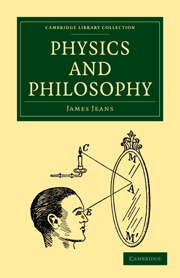Book contents
- Frontmatter
- Contents
- Preface
- I What are Physics and Philosophy?
- II How do we know? (Descartes to Kant; Eddington)
- III The two voices of Science and Philosophy (Plato to the present)
- IV The Passing of the Mechanical Age (Newton to Einstein)
- V The New Physics (Planck, Rutherford, Bohr)
- VI From Appearance to Reality (Bohr, Heisenberg, de Broglie, Schrödinger, Dirac)
- VII Some Problems of Philosophy
- Index
III - The two voices of Science and Philosophy (Plato to the present)
Published online by Cambridge University Press: 07 September 2010
- Frontmatter
- Contents
- Preface
- I What are Physics and Philosophy?
- II How do we know? (Descartes to Kant; Eddington)
- III The two voices of Science and Philosophy (Plato to the present)
- IV The Passing of the Mechanical Age (Newton to Einstein)
- V The New Physics (Planck, Rutherford, Bohr)
- VI From Appearance to Reality (Bohr, Heisenberg, de Broglie, Schrödinger, Dirac)
- VII Some Problems of Philosophy
- Index
Summary
We have seen that knowledge of the external world can come only through observation and experiment. These tell us that the world is rational—its events follow one another according to definite laws, and so form a regular pattern. The primary aim of physics is the discovery of this pattern; we have seen that it can be described only in mathematical language.
We have seen that physics cannot clothe the mathematical symbols of this description with their true physical meaning, but physics and philosophy may properly engage in joint discussion as to their possible meanings, and the most probable interpretation of the pattern of events. Yet there are many hindrances to such discussion. In the present chapter we shall try to unearth some of these and eliminate them with a view to clearing the ground for the discussions which are to follow.
DIFFERENCES OF LANGUAGE
Foremost among these hindrances are differences of language and of terminology; when science and philosophy are not speaking entirely different languages, they, often seem at least to employ different idioms.
More than three hundred years have elapsed since Francis Bacon wrote of the ‘Idols’ which beset men's minds when they try to discover truth. The most troublesome of these, he said, are the idols of the market-place, the place where men meet to talk with one another. For words are unsuited to the expression of accurate or scientific thought, and apparent differences of opinion often result from inadequate definition of the terms employed in the discussion.
- Type
- Chapter
- Information
- Physics and Philosophy , pp. 82 - 104Publisher: Cambridge University PressPrint publication year: 2009First published in: 1942



